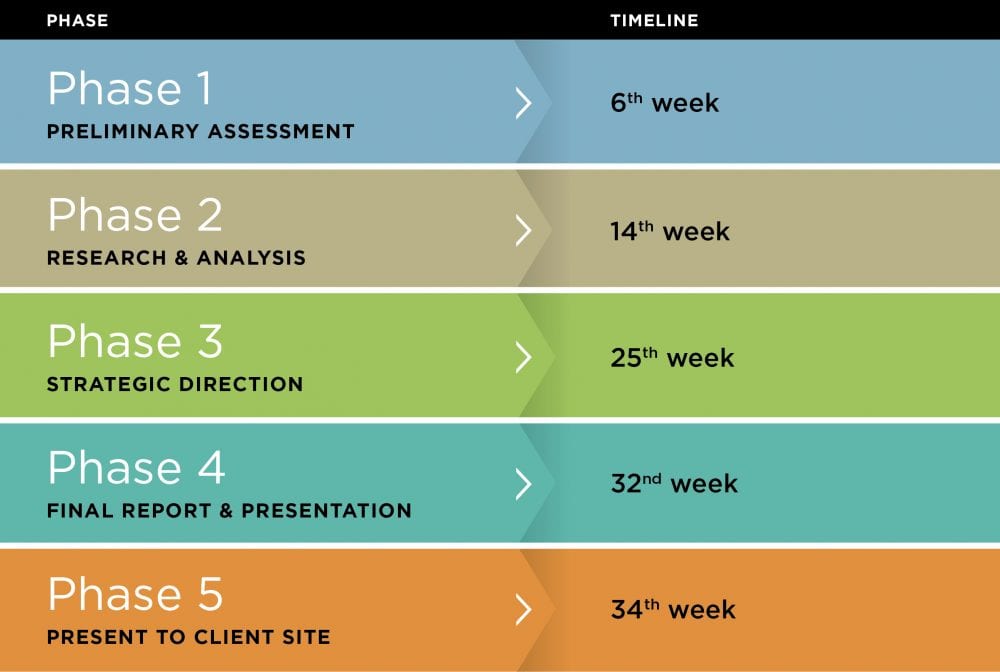-
Strategy Field Study: Companies
Benefits of Participating in the Strategy Field StudyAn Independent, Highly Detailed Analysis of Your Organization and Its Environment at No Cost.
Feedback from past clients indicates that they most appreciate the in-depth analysis and objective assessment of their business. Market and customer research, financial and profitability analysis, social marketing suggestions and management organizational recommendations are also frequently noted as valued aspects of the study.
Practical Recommendations
The final deliverable is a 40-page report that details the findings, specific and actionable recommendations and a
practical implementation plan for executing the recommendations.Creative Exchange
CEOs often find that insights and perspectives from the MBA students stimulate healthy internal debate on strategy. Many tell us they simply enjoyed the experience of working with the students and wish they had spent more time with them.
Meaningful Partnership in Business Education
Many client sites participate because of their commitment to supporting business education.
-
Learn more about Recruitment at Schulich

Who is Involved
The three stakeholders in the Strategy Field Study are the student teams, the faculty advisory panel, and participating client sites. Each has a unique involvement in the process.
- Our Students Enthusiasm, intelligence and maturity. These are the qualities our students bring to each study. At a median age of 29, most Schulich MBA students have several years of full-time work experience. That means they bring their own professional experience and academic training to the task. Furthermore, by working in teams of six to seven, the students draw on a diverse set of skills and backgrounds to ensure a broad set of perspectives for analysis.
- Faculty Involvement Each student group works under the guidance of three faculty members who meet with them regularly, give feedback and evaluate the final report. The faculty panel combines professors and practitioners with a broad range of expertise and experiences.
- Participating Companies and Organizations Participating organizations can be for private and public companies, not-for-profit organizations, or public sector organizations. They provide the context for the study and contribute through inputs and feedback by their executives.
Who is Eligible
Businesses that fit into the Strategy Field Study program will include:
- independent companies with one or several businesses;
- a subsidiary or division of a larger organization, provided that sufficient strategic and investment decisions are made locally and students can study the relationships and interdependencies with the parent corporation;
- public and private companies.
Company sites need to be of sufficient revenues to warrant such a comprehensive study – normally at a minimum of $5 million annually.
Entrepreneurial firms are suitable sites for our students specializing in that field. Smaller companies with less than $5 million in revenue work well if they operate in a field that exhibits strategic complexity resulting from rapid changes or growth.
Not-for-profit organizations in the arts, health and social services and public sector organizations suit our students focusing on these areas.
Time Commitment
The CEO can expect to spend ten to twelve hours in total, spread over the eight months of the assignment. We suggest students keep you up to date on their progress every few weeks. Your own level of interest in the project may lead you to spend more time. All meetings will be arranged at a time and location suitable to you.
The student team meets with other senior executives and managers as needed. Many larger companies designate a liaison manager who may spend a little more time with the students than would other executives.
Confidentiality and Access to Information
Access to information is crucial for the study to have value. This means that the client site will be required “to open the books” to the students who act as confidential consultants to the executives.
We understand that some information must be withheld, for example research documents or new product plans. Otherwise, we expect that the students will have access to data on cost, profitability, important contracts, and other confidential information.
A legal agreement is typically signed at the outset of the study between Schulich and the client site demonstrating both parties’ commitment to the learning experience and an agreement regarding confidentiality and non-disclosure. The school provides the template for that legal agreement.
All members of the Strategy Field Study, including the students and faculty, are bound by confidentiality agreements. All information provided to the student group will be kept in the strictest confidence. Reports are seen only by the faculty advisors. In addition to your copy, completed reports are used only for grading purposes, with one copy retained under tight control; all other copies submitted to the faculty are destroyed.
We are serious about confidentiality and the associated ethical processes.
The Cost
There is no fee to you, since the Strategy Field Study is an academic requirement of the MBA and MPA programs. However, many organizations pay the students’ out-of-pocket expenses for such items as copying and binding reports, long distance phone calls, travel (if necessary), and electronic database searches. Students are encouraged to review the question of expenses with you early in the project.
Some firms have been so pleased with the study that they have made voluntary donations to support the Faculty’s strategy study program.
Consulting Methodology

Deliverables
-
- Describe internal and external environment
- Conduct preliminary assessment
- Prepare research plan and project plan
- Provide comprehensive analysis of internal and external environment
- Assess issues and alternatives (preliminary)
- Finalize key issues and rationale
- Evaluate alternatives
- Develop recommendations
- Provide highlights of strategic assessment
- Explain and provide rationale for key issues, recommendations and implementation plan
- Amend Final Report and Presentation
- Present to client
Faculty Chairs
Alan Middleton
Barbara Henders
Derrek Lennox
Jane-Michele Clark
John Milne
Kelly Lecouvie
Kostas Tsambourlianos
Larry Ginsberg
Sanjay Dhebar
Steve Pulver
How Do You Get Involved?
Interested companies should contact Ingo Holzinger, Director of the Strategy Field Study Program, at mgmt6100@schulich.yorku.ca.